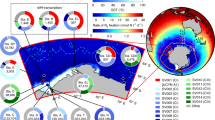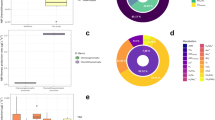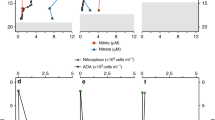Abstract
The oceanic carbon cycle has traditionally been viewed as a reversible, one step reduction–oxidation reaction (CO2⇌CH2O). Principle pathways were thought to involve eukaryotic photoautotrophy and oxygen-dependent bacterial respiration, respectively. However, prokaryotic (cyanobacterial) photoautotrophy is now well documented and has even been proposed as a major carbon pathway1–6. In a previous study of the mesopelagic zone in the North Pacific Ocean7, the observed downward fluxes of organic carbon, nitrogen, ATP and RNA suggested production in situ of new particulate organic carbon at 700–900 m. Here we present evidence that this is indeed the case and that it is mediated by bacterial chemolithotrophy. Energy for this process may be in part provided by detrital NH+4 derived from the downward flux of large particles.
This is a preview of subscription content, access via your institution
Access options
Subscribe to this journal
Receive 51 print issues and online access
$199.00 per year
only $3.90 per issue
Buy this article
- Purchase on Springer Link
- Instant access to full article PDF
Prices may be subject to local taxes which are calculated during checkout
Similar content being viewed by others
References
Waterbury, J. B., Watson, S. W., Buillard, R. R. & Brand, L. E. Nature 277, 293–294 (1979).
Johnson, P. W. & Sieburth, J. M. Limnol. Oceanogr. 24, 928–935 (1979).
Krempin, D. W. & Sullivan, C. W. Can. J. Microbiol. 27, 1341–1344 (1981).
Morris, I. & Glover, H. Limnol. Oceanogr. 26, 957–961 (1981).
Li, W. K. et al. Science 219, 292–295 (1983).
Platt, T., Subba Rao, D. V. & Irwin, B. Nature 301, 702–704 (1983).
Karl, D. M. & Knauer, G. A. Deep-Sea Res. (in the press).
Knauer, G. A., Martin, J. H. & Bruland, K. W. Deep-Sea Res. 26 A, 97–108 (1979).
Fellows, D. A., Karl, D. M. & Knauer, G. A. Deep-Sea Res. 28 A, 921–936 (1981).
Ward, B. B. & Perry, M. J. Appl. envir. Microbiol. 39, 913–918 (1980).
Ward, B. B. J. mar. Res. 40, 1155–1172 (1982).
Watson, S. W. Limnol. Oceanogr. 10, R274–289 (1965).
Carlucci, A. F. & Strickland, J. D. H. J. exp. mar. Biol. Ecol. 2, 156–166 (1968).
Kornberg, H. L. Symp. Soc. gen. Microbiol. 15, 8–39 (1965).
Romanenko, V. I. Microbiology 34, 334–339 (1965).
Overbeck, J. Arch. Hydrobiol. Beih. Ergebn. Limnol. 13, 56–61 (1979).
Peck, H. D. A. Rev. Microbiol. 22, 489–518 (1968).
Kelly, D. P. A. Rev. Microbiol. 25, 177–210 (1971).
Painter, H. A. Water Res. 4, 393–450 (1970).
Karl, D. M. & Winn, C. D. in Heterotrophic Activity in the Sea (eds Hobbie, J. E. & Williams, P. J. leB.) (Plenum, New York, in the press).
Author information
Authors and Affiliations
Rights and permissions
About this article
Cite this article
Karl, D., Knauer, G., Martin, J. et al. Bacterial chemolithotrophy in the ocean is associated with sinking particles. Nature 309, 54–56 (1984). https://doi.org/10.1038/309054a0
Received:
Accepted:
Issue Date:
DOI: https://doi.org/10.1038/309054a0
This article is cited by
-
Microscale dynamics promote segregated denitrification in diatom aggregates sinking slowly in bulk oxygenated seawater
Communications Earth & Environment (2023)
-
Planktonic microbial signatures of sinking particle export in the open ocean’s interior
Nature Communications (2023)
-
Metapangenomics reveals depth-dependent shifts in metabolic potential for the ubiquitous marine bacterial SAR324 lineage
Microbiome (2021)
-
Distinct nitrogen cycling and steep chemical gradients in Trichodesmium colonies
The ISME Journal (2020)
-
Stable aerobic and anaerobic coexistence in anoxic marine zones
The ISME Journal (2020)
Comments
By submitting a comment you agree to abide by our Terms and Community Guidelines. If you find something abusive or that does not comply with our terms or guidelines please flag it as inappropriate.



